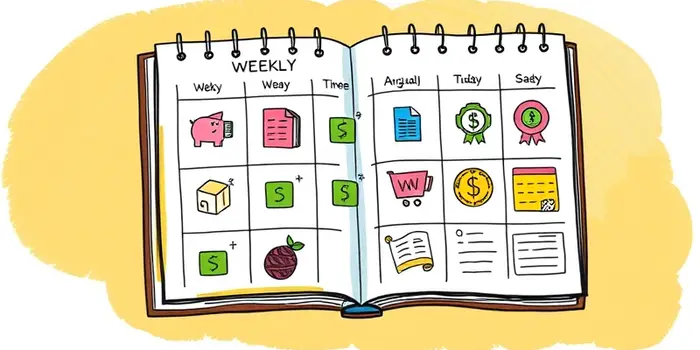In today’s fast-paced world, managing money can feel overwhelming. By dedicating specific days each week to various financial topics, individuals and teams can cultivate deeper understanding, stronger habits, and measurable progress. Financial theme days provide a structured, engaging approach to personal finance that balances learning with action.
What Are Financial Theme Days?
Financial theme days are designated days within a week centered on a particular personal finance topic, skill, or strategy. Instead of trying to tackle every financial issue at once, you focus on one area per day.
This method leverages the principles of themed time management and helps individuals avoid burnout. By focusing on one area of finances at a time, you can build habits, deepen knowledge, and make consistent progress without feeling inundated.
Benefits of Financial Theme Days
Adopting financial theme days offers both emotional and practical advantages. For many, money worries contribute significantly to stress and anxiety. Instituting regular, focused sessions on finances can alleviate that burden.
Structured engagement boosts confidence and decision-making. Data shows that targeted learning drives real change: individuals who consistently review budgets and set goals report higher savings rates and improved credit health.
Organizations also see benefits. Encouraging teams to participate in weekly financial topics fosters a supportive culture and promotes structured learning and financial confidence across the board. Whether in a corporate office or small community group, employees feel empowered to discuss money openly, reducing stigma and building cohesion.
Key benefits include:
- Increased financial literacy and competence
- Reduced anxiety around money decisions
- Enhanced team engagement and communication
- Clear path toward achieving long-term goals
Weekly Theme Day Framework
Below is an example framework for structuring your week. Each day focuses on a distinct pillar of financial health, ensuring comprehensive coverage over time.
You can adjust themes to suit personal priorities or organizational goals. Swap topics as needed to cover earning, saving, spending, borrowing, investing, and protecting.
Feature Topics for Each Theme Day
To maximize the impact of each theme day, integrate curated resources and exercises. Tailoring your content keeps participants engaged and ensures steady progress.
- Goal Setting and Reflection: Define clear short- and long-term financial goals, track weekly milestones.
- Budgeting and Tracking: Use apps or spreadsheets to monitor income and expenses in real time.
- Savings and Planned Spending: Automate savings, designate funds for planned purchases versus impulse buys.
- Credit and Debt: Understand credit scores, evaluate interest rates, develop debt payoff strategies.
- Investing and Retirement: Explore account types, diversification basics, compound interest benefits.
- Emotional Connection: Discuss how financial well-being influences mental health and overall satisfaction.
- Team Engagement: Host roundtables or digital forums for open discussion about money.
Sample Activity Ideas
Innovative activities breathe life into theme days. Engaging formats, peer-to-peer learning, and friendly competitions inspire consistent participation.
- Host a “Financial Wellness Fair” with expert booths and live demos.
- Deliver weekly “Money Minutes”—short video or discussion segments aligned with the day’s theme.
- Launch a “Savings Challenge” on Wealth-Building Wednesday with progress trackers and rewards.
- Offer “Debt Management Clinics” on Debt-Free Thursday for personalized advice.
- Conduct “Sunday Reflection Sessions” to review wins, recalibrate goals, and offer peer encouragement.
Implementation Tips and Measurement
Successful rollout hinges on careful planning and consistent follow-through. Start with a pilot program or personal trial period to iron out kinks.
Encourage participants to journal or use shared digital trackers. Visibility into progress fosters accountability and motivation. After a month, review participation rates, outcomes, and feedback to refine the approach.
- Consistency is key: repeat theme days weekly for habit formation.
- Keep it engaging: mix practical exercises, storytelling, and data-driven insights.
- Track results: use surveys, financial metrics, and measurable progress and accountability tools to gauge impact.
Leverage Observed Financial Theme Days
Align your weekly program with national and global observances for extra momentum. For example, launch or refresh initiatives around:
- National Financial Awareness Day (August 14) to kick off new campaigns.
- World Mental Health Day to highlight the link between finances and well-being.
- Financial Literacy Month and National Savings Day for targeted workshops.
- National Philanthropy Day to explore charitable giving aligned with personal values.
Conclusion
Financial theme days transform scattered money management into a focused, purposeful journey. By dedicating each day to a vital aspect of financial health, individuals and teams can clear roadmap for financial growth, reduce stress, and build lasting confidence. Start small, stay consistent, and celebrate every milestone—your financial future will thank you.
References
- https://learnlux.com/resources/workplace-financial-wellbeing-calendar
- https://www.payescape.com/blog/national-financial-awareness-day
- https://whiterivercu.com/news/celebrating-national-financial-awareness-day/
- https://www.msdc.org/detail/news/2023/08/14/today-is-national-financial-awareness-day
- https://www.myscoreiq.com/national-financial-awareness-day/
- https://www.moneyprodigy.com/financial-literacy-week-themes/
- https://blog.hubspot.com/marketing/how-write-memo
- https://www.psecu.com/learn/national-financial-awareness-day










